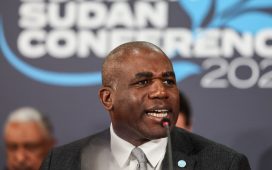Key points from Fujitsu CEO appearance at Post Office Horizon IT inquiry
Today’s session of the Post Office Horizon IT inquiry was dedicated to hearing evidence from Fujitsu’s Europe chief, Paul Patterson. Here are the key points that emerged …
-
Patterson said it is “shameful and appalling” that courts hearing cases against Post Office operators over missing funds were not told of 29 bugs identified as early as 1999 in the accounting system it built.
-
When bugs were acknowledged, witness statements from Fujitsu staff due to be heard in court were then edited by the Post Office as it sought to maintain the line that the system was working well as it pursued innocent people through the courts. Patterson agreed that both organisations had failed the accused.
-
Patterson said Fujitsu had “let society down” and that the company would contribute to a fund to compensate “victims of this crime” although he admitted to not having met a single Post Office operator as he had not believed it appropriate.
-
Patterson said there was “evidence” that Fujitsu employees had a “don’t share with the Post Office” approach to a document chronicling the known errors in the system.
-
He said the “vast majority” of bugs, errors and defects (BEDs) in the Horizon system were shared with the Post Office contemporaneously. But Post Office operators were not informed about known errors nor provided with the accessible raw data. Patterson admitted that Fujitsu’s witness statements in support of Post Office cases in the criminal and civil courts were misleading.
-
Fujitsu had previously described its audit data as “gold standard”. Pressed on this, Patterson responded: “No, it wasn’t.”
-
Patterson, the most senior Fujitsu Services Ltd director, who started his career at the company in sales, had opened his evidence with an apology to the men and women pursued by the Post Office with the assistance of his company.
-
Patterson said: “To the subpostmasters and their families, we apologise, Fujitsu apologises and is sorry for our part in this appalling miscarriage of justice. We are determined to support this inquiry and get to the truth, wherever it lies, and at the conclusion of the inquiry and the guidance from this inquiry engage with government on suitable contributions and redress to the subpostmasters and their families.”
You can read Daniel Boffey’s full report on the day’s proceedings here: Post Office IT scandal – Fujitsu boss condemns ‘shameful’ editing of witness statements
Key events
Closing summary …
We will be wrapping this blog up shortly. Here are the main political headlines of the day …
-
The owner of Port Talbot steelworks has confirmed that the plant’s two blast furnaces will shut down, in what unions have described as an “absolute disgrace” that will cost up to 2,800 jobs directly and many more in the south Wales community. Rishi Sunak insisted that the government’s investment showed it was “absolutely committed” to British steelmaking, but Keir Starmer is urging the government to take another look at the plan proposed by steel unions that would have saved thousands of jobs
-
A Fujitsu boss condemned the “shameful” editing of witness statements and said the company had “clearly let society down” while appearing before the Post Office Horizon IT inquiry. He also offered an apology for what he described as an “appalling miscarriage of justice”.
-
Downing Street added to an earlier Sunak statement that he was “determined” to get the Rwanda bill through parliament “as quickly as possible” by saying it was “confident” Rwanda would implement improved measures into its asylum system in time for a new treaty with the UK being ratified by parliament.
-
The Home Office has hired an aircraft hangar and aeroplane body to train security staff on how to deport people, as the UK government increases the number of people it forcibly removes each year.
-
Sunak added to speculation on pre-election tax cuts by saying there was “more to come” if voters stuck with the Conservatives. Speaking to broadcasters during his visit to Hampshire, Sunak said a 2p cut to the main rate of national insurance that came into force this month had been a “tax cut for 27 million people in work”. Inflation unexpectedly jumped on Wednesday, and this morning figures revealed retailers in Great Britain suffered a dire Christmas, with shops recording the biggest fall in monthly sales since closing during the pandemic.
-
The defence secretary, Grant Shapps, posted on social media that yesterday he visited HMS Diamond, which is deployed in the Red Sea and has been one of the vessels involved in UK strikes against Yemen’s Houthis.
-
Nicola Sturgeon has been accused of “a shocking betrayal of the people of Scotland” as it emerged that the former first minister, along with other senior ministers and health officials, deleted all their WhatsApp messages related to the Covid pandemic.
-
Three victims of IRA bombings in London and Manchester can sue Gerry Adams in a personal capacity for damages, a high court judge has ruled.
-
Northern Ireland secretary Chris Heaton-Harris said he will introduce “pragmatic, appropriate and limited” legislation to try to break the political deadlock there which has been preventing Stormont from meeting since May 2022.
-
The European court of human rights (ECHR) has issued a press release stating that Ireland has lodged an inter-state application against the UK over the Northern Ireland Troubles (Legacy and Reconciliation) Act 2023.
-
Churn in the UK’s civil service is at its highest level since 2010 aside from its post-pandemic peak, with almost 12% of Whitehall staff changing department or leaving the government workforce in the year to the end of March, according to an analysis.
Thank you for reading today. I will be back with you bright and early on Monday.
Key points from Fujitsu CEO appearance at Post Office Horizon IT inquiry
Today’s session of the Post Office Horizon IT inquiry was dedicated to hearing evidence from Fujitsu’s Europe chief, Paul Patterson. Here are the key points that emerged …
-
Patterson said it is “shameful and appalling” that courts hearing cases against Post Office operators over missing funds were not told of 29 bugs identified as early as 1999 in the accounting system it built.
-
When bugs were acknowledged, witness statements from Fujitsu staff due to be heard in court were then edited by the Post Office as it sought to maintain the line that the system was working well as it pursued innocent people through the courts. Patterson agreed that both organisations had failed the accused.
-
Patterson said Fujitsu had “let society down” and that the company would contribute to a fund to compensate “victims of this crime” although he admitted to not having met a single Post Office operator as he had not believed it appropriate.
-
Patterson said there was “evidence” that Fujitsu employees had a “don’t share with the Post Office” approach to a document chronicling the known errors in the system.
-
He said the “vast majority” of bugs, errors and defects (BEDs) in the Horizon system were shared with the Post Office contemporaneously. But Post Office operators were not informed about known errors nor provided with the accessible raw data. Patterson admitted that Fujitsu’s witness statements in support of Post Office cases in the criminal and civil courts were misleading.
-
Fujitsu had previously described its audit data as “gold standard”. Pressed on this, Patterson responded: “No, it wasn’t.”
-
Patterson, the most senior Fujitsu Services Ltd director, who started his career at the company in sales, had opened his evidence with an apology to the men and women pursued by the Post Office with the assistance of his company.
-
Patterson said: “To the subpostmasters and their families, we apologise, Fujitsu apologises and is sorry for our part in this appalling miscarriage of justice. We are determined to support this inquiry and get to the truth, wherever it lies, and at the conclusion of the inquiry and the guidance from this inquiry engage with government on suitable contributions and redress to the subpostmasters and their families.”
You can read Daniel Boffey’s full report on the day’s proceedings here: Post Office IT scandal – Fujitsu boss condemns ‘shameful’ editing of witness statements

Rowena Mason
Rowena Mason is the Guardian’s Whitehall editor
Churn in the UK’s civil service is at its highest level since 2010 aside from its post-pandemic peak, with almost 12% of Whitehall staff changing department or leaving the government workforce in the year to the end of March, according to an analysis.
The Institute for Government’s annual Whitehall monitor found there had been a drop since 2022 when, after the worst of the Covid crisis, 13.6% of civil servants left their jobs – but it remained higher than at any point since the Conservatives took power 14 years ago.
In the introduction to the report, Dr Hannah White, the director of the IFG, said: “Staff turnover fell from its immediate post-pandemic peak but remains too high and continues to harm institutional memory. Further real-terms pay cuts continue to hinder the civil service’s ability to attract and retain top talent, as do slow and onerous processes for recruiting from outside government. A worrying fall in staff morale has raised questions about how the institution is led.”
Rhys Clyne, one of the report’s authors, said churn was a serious and longstanding problem in the civil service, and its high level may be related partly to dissatisfaction with pay and levels of morale.
Read more of Rowena Mason’s report here: Staff turnover in UK civil service ‘at highest level since 2010’
The Plaid Cymru leader, Rhun ap Iorwerth, has responded to Rishi Sunak’s earlier comments that the government was “absolutely committed” to British steelmaking. He posted to social media:
Hollow words and little action by the prime minister on Tata just won’t cut it. The economic uncertainty his party created is bad enough, let alone the personal uncertainty crippling thousands of workers and their families in Port Talbot and beyond today. The UK government claims it’s committed to the future of steelmaking – at this eleventh hour, the reality must match the rhetoric.
Hollow words and little action by the Prime Minister on Tata just won’t cut it.
The economic uncertainty his party created is bad enough, let alone the personal uncertainty crippling thousands of workers and their families in Port Talbot and beyond today.
— Rhun ap Iorwerth (@RhunapIorwerth) January 19, 2024

Graeme Wearden
The Labour leader, Keir Starmer, is urging the government to take another look at the plan proposed by steel unions that would have saved thousands of jobs at the Tata Steel plant.
Starmer said he was “very concerned” after Tata Steel confirmed plans to close blast furnaces at its plant in Port Talbot, south Wales.
He told broadcasters:
I was there just in October so I know how this is going to impact on the workforce. The government said it had a plan for steel. It transpires the plan involves thousands of redundancies. There’s a better plan, a multi-union plan, that the government needs to look at again.
That’s a viable way forward. It’s vital we have a viable steel industry in the UK. Labour has got a plan for that viable future, not just for the next year or two but for decades to come.


Nils Pratley
One of the main stories today has been the announcement that the Tata Steel blast furnaces at Port Talbot are to close, costing up to 2,800 jobs. Nils Pratley has this analysis of the alternative plan being suggested by unions:
The plan from the Community and GMB unions – rejected as unaffordable by Tata – was not an other-worldly proposal that imagined Port Talbot’s blast furnaces could keep polluting for ever, or that every last job could be preserved (just that compulsory redundancies could be avoided). It made the reasonable-sounding point that an electric arc furnace-only approach carries industrial risks and has uncertain benefits for global emissions reductions. For purer specialist grades, UK manufacturers may end up importing those volumes from blast furnaces elsewhere.
The unions’ proposal called for a two-stage, decade-long transition to “green” steel. In stage one, only one of the blast furnaces – the one that is near the end of its life anyway – would be closed and the other would keep producing until 2032. The output would be replaced by an electric arc furnace half the size of the model proposed by Tata. In the second stage, the other blast furnace would close but the choice of replacement technology would be kept under review. It could be direct reduced iron and hydrogen, the green steel technology that uses raw materials and is being widely adopted in Germany and Scandinavia.
“It is an industrial choice we are making as a country to get rid of blast furnaces,” says Jess Ralston of the independent analysts Energy and Climate Intelligence Unit. “The government keeps talking about energy security, but this move is not going to do anything for energy security. It is going to make it worse.”
Read more of Nils Pratley’s analysis here: Tata’s Port Talbot decision goes beyond Wales and even steel
Fujitsu Europe CEO: company ‘let society down’ and trust in technology ‘has been broken’
The head of Fujitsu Europe, Paul Patterson, has said trust in technology “has been broken” as a result of the Horizon scandal, and offered to meet post office operators who had been affected. He said the company had “clearly let society down”.
At the afternoon session, Patterson was being questioned by Sam Stein KC, a lawyer acting on behalf of post office operators.
Referring to Fujitsu’s online mission statement “to build trust in society through innovation”, Stein asked: “Do you agree, instead, that the combination of Fujitsu and the Post Office’s creation of this scandal has damaged trust in innovation within society?”
Patterson replied: “I think the history of this appalling miscarriage, Mr Stein, would tend to point that yes, trust has been broken and trust in technology and how technology is used and not used.”
Stein later asked: “Will you commit today to meeting with subpostmasters, their legal representatives … and discussing with them the way forward that can assist in seeking to show that Fujitsu means what it says by its apology and by its commitment to provide financial redress?”
Patterson said “I have not met any subpostmasters in the past because I didn’t feel it was appropriate for me to do that. If that is a request from the subpostmasters and their representation, I will absolutely do that.”
During the course of the afternoon session, he said:
This is a decades-old miscarriage which started a long, long time ago and involves many, many people in organisations, in that I think Fujitsu more recently, as we’ve understood more, we have clearly let society down and the subpostmasters down.
I think we had our obligations to the Post Office to be at the front of everything we were doing and that was wrong.
I think subsequently we’ve now seen where the evidence is taking us and the investigation is taking us and that’s why you’ve had the statements from Fujitsu more recently.
I can’t comment on the past, I don’t know why things weren’t done in 1999 or 2005 – I don’t know. But what I can say is that as long as I’m here and doing what I’m doing, I’m going to do everything to make sure that we get to the truth.

Rowena Mason
Rowena Mason is the Guardian’s Whitehall editor
Sky have issued a slightly longer version of Rishi Sunak’s awkward encounter with a former health worker challenging him about the struggling state of the NHS, which shows the encounter want on longer than first shown.
In the initially released clip, Sunak was seen being hustled away by aides as the woman said to him “If you had a problem, you could go to the hospital. My daughter spent seven hours waiting ….”
The longer version shows that the prime minister continued talking to her as she carried on walking with him, saying: “I’m sorry to hear that. The key thing is we have resolved all the industrial action apart from the junior doctors who have still not settled yet.”
At the end of the encounter, the woman thanked him and shook his hand.
Sunak had been explaining to the woman that there was progress in reducing the waiting lists before strikes hampered the government’s efforts to bring them down last year.
A No 10 source said the interaction had ended cordially and pointed out that they had carried on walking and talking together.
The footage had been captured by an off-duty Sky News camera operator.
Asked about the incident, the Labour leader, Sir Keir Starmer, told broadcasters: “It further reinforces, I think, what many people across the country think: that this prime minister doesn’t talk to people, doesn’t engage, doesn’t understand what so many people are going through.
“We have a terrible problem with our waiting lists and that is why we have been really clear that we would get rid of the non-dom tax status where the super-rich don’t pay their tax in this country, and use that to bring down those waiting lists … We have got a plan, we engage with people over our plan, we don’t laugh and walk away.”
Labour: Sturgeon’s deleted Covid WhatsApp messages are ‘shocking betrayal of people of Scotland’

Libby Brooks
Libby Brooks is Scotland correspondent
There has been a furious response across the political spectrum to the official confirmation that the former first minister of Scotland Nicola Sturgeon and her deputy John Swinney deleted their Covid messages – and that the national clinical director, Jason Leitch, joked in a group chat about his “pre-bed ritual” of deletion. [See 14.24 GMT]
The Scottish Labour deputy Jackie Baillie described the news as “a shocking betrayal of the people of Scotland”, and said it “shows the lengths that Nicola Sturgeon is prepared to go to in order to prevent justice for Covid-bereaved families”.
The Scottish Conservative leader, Douglas Ross, said both Sturgeon and Swinney “have huge questions to answer over their conduct in the wake of this devastating revelation”, adding that their actions “beg a very simple question: what were they trying to hide? Shamefully and outrageously for families of those who died during the pandemic, we may never know.”
In December, the UK prime minister, Rishi Sunak, told the Covid inquiry he was not advised that he should save WhatsApp messages from his phone, even after it was set up, and claimed he had no messages remaining from the pandemic period.
Sturgeon herself has previously responded through a spokesperson: “Any messages she had she handled and dealt with in line with the Scottish government policies. Nicola has provided a number of written statements to the UK inquiry – totally hundreds of pages – and welcomes the opportunity to give oral evidence to the inquiry again next month when she will answer all questions put to her.”
There has been some reaction to that awkward interaction between Rishi Sunak and a woman in Winchester over the NHS, where the prime minister appeared to laugh at her suggestion he could put the NHS back to how it was and then walk away from her.
The shadow health secretary, Wes Streeting, said: “Rishi Sunak has no idea of the misery NHS patients are going through. When patients try to tell him, he laughs in their faces and walks away. When Sunak asks for their vote later this year, he will get a taste of his own medicine.”
The Liberal Democrat Christine Jardine accused the prime minister of “laughing in the face of a former health worker whilst they are trying to explain to him the dire straits the NHS” is in, calling it “frankly shocking”.
The woman had been saying to Sunak: “You could make it all go back to how it used to be … where, if you had a problem, you could go to the hospital. My daughter spent seven hours waiting.”
PA Media has put together some facts and figures on NHS waiting lists in England, which Sunak’s government is responsible for. The prime minister had been trying to tell the woman that the backlog of cases in the NHS had been going down during the periods there were not strikes.
It reports about 6.39 million patients across England were waiting for routine hospital treatment in November, figures suggest, which was down slightly from 6.44 million in October.
But the NHS in England is still failing to hit most of its key performance targets, with 11,168 people waiting more than 18 months to start routine hospital treatment at the end of November, up from the previous month.
A&E times also worsened in England, with 69.4% of patients seen within four hours in December, down from 69.7% in November and against a target set for March this year of 76%.
Health has been a primarily devolved matter for Scotland, Wales and Northern Ireland since 1999.
The Post Office Horizon IT inquiry has wrapped up for the day. Paul Patterson, Fujitsu’s Europe CEO, has been told he can expect to be recalled at a later date. He is told he is released as a witness for now, so that he is able to talk to his team in order to answer questions and make such further inquiries as the proceedings may require. The presiding retired judge high court judge Sir Wyn Williams said it wouldn’t be practical in these circumstances to do anything else.
The inquiry will resume on Tuesday at 10am with a session featuring Robert Daily – a former Post Office investigator involved in the criminal investigation of Peter Holmes and William Quarm – in a section titled “Criminal Investigations and Prosecutions in Scotland and Northern Ireland” which is expected to last two weeks.










